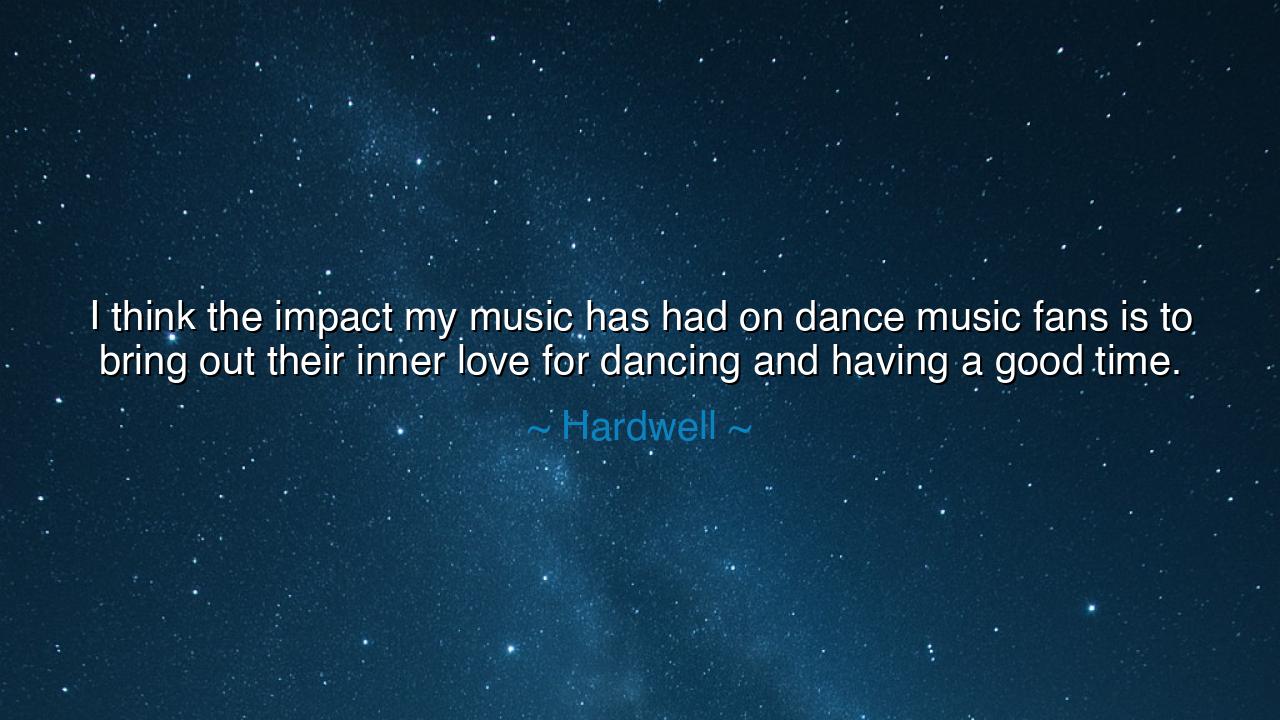
I think the impact my music has had on dance music fans is to
I think the impact my music has had on dance music fans is to bring out their inner love for dancing and having a good time.






The words of Hardwell—“I think the impact my music has had on dance music fans is to bring out their inner love for dancing and having a good time.”—are a reminder that art’s highest calling is not merely to impress the mind, but to stir the heart, to awaken the hidden joy within the soul. In these words, the great DJ speaks not of fame or wealth, but of the power to unlock what already lies within people: the ancient, unbreakable rhythm of life that beats in every human chest.
From the beginning of time, man has gathered around fire, lifted his voice in song, and stamped his feet upon the earth in dance. It was not for riches, not for recognition, but for the sheer celebration of existence. Hardwell stands in this same lineage of musicians, his music becoming the flame around which modern tribes gather—not in villages of old, but in festivals, arenas, and cities. His impact lies in drawing forth what people sometimes forget: that to move, to laugh, to lose oneself in rhythm is to taste freedom, if only for a moment.
History itself testifies to this truth. When jazz was born in New Orleans, it swept across the world, igniting the spirits of millions. It was more than notes and instruments—it was a new freedom of movement, a release of emotion that made listeners rise from their chairs to sway, to twirl, to feel alive. Just as Hardwell speaks of awakening the inner love for dancing, so too did jazz and later rock ‘n’ roll unshackle generations from stiffness, reminding them that life is not only duty but also joy.
This power of music to awaken joy has even healed nations. After the fall of apartheid in South Africa, song and dance became tools of unity, binding wounds too deep for words. Communities that had been torn apart gathered together, drumming and dancing in celebration of their newfound freedom. The impact of music was not only entertainment—it was transformation, a visible sign that the spirit, once chained, had learned again to soar.
What Hardwell reveals is that the greatest measure of music is not in charts or sales, but in what it does within people. If it awakens laughter where there was silence, if it calls the weary to rise from their despair, if it unites strangers in shared rhythm, then it has fulfilled its highest purpose. For when people dance together, barriers fade; the soul remembers it was made not only to endure but to rejoice.
The lesson is clear: we must all seek that which awakens the inner love of life within us. For some it may be music, for others painting, writing, running, or building. Whatever it is, let it not remain hidden. Let it spill forth into the world so that others may also remember joy. Just as Hardwell brings people to their feet, so too can each of us bring life to others through our gifts, no matter how small they may seem.
Practically, this means giving yourself permission to celebrate. Do not chain yourself only to labor and worry. Make time to move, to create, to laugh with others. Share music, dance when the heart compels you, and let your presence awaken joy in those around you. In doing so, you become not just a consumer of life but a giver of light, carrying forward the ancient rhythm that has always bound humanity together.
Thus, let these words be etched in memory: the true impact of any art is measured by the joy it awakens. And as Hardwell has shown, to inspire dancing, to rekindle the love of living—that is to leave a legacy greater than wealth, greater than power. It is to remind humanity that beneath all burdens, life is still a song, and we were made to dance.






AAdministratorAdministrator
Welcome, honored guests. Please leave a comment, we will respond soon